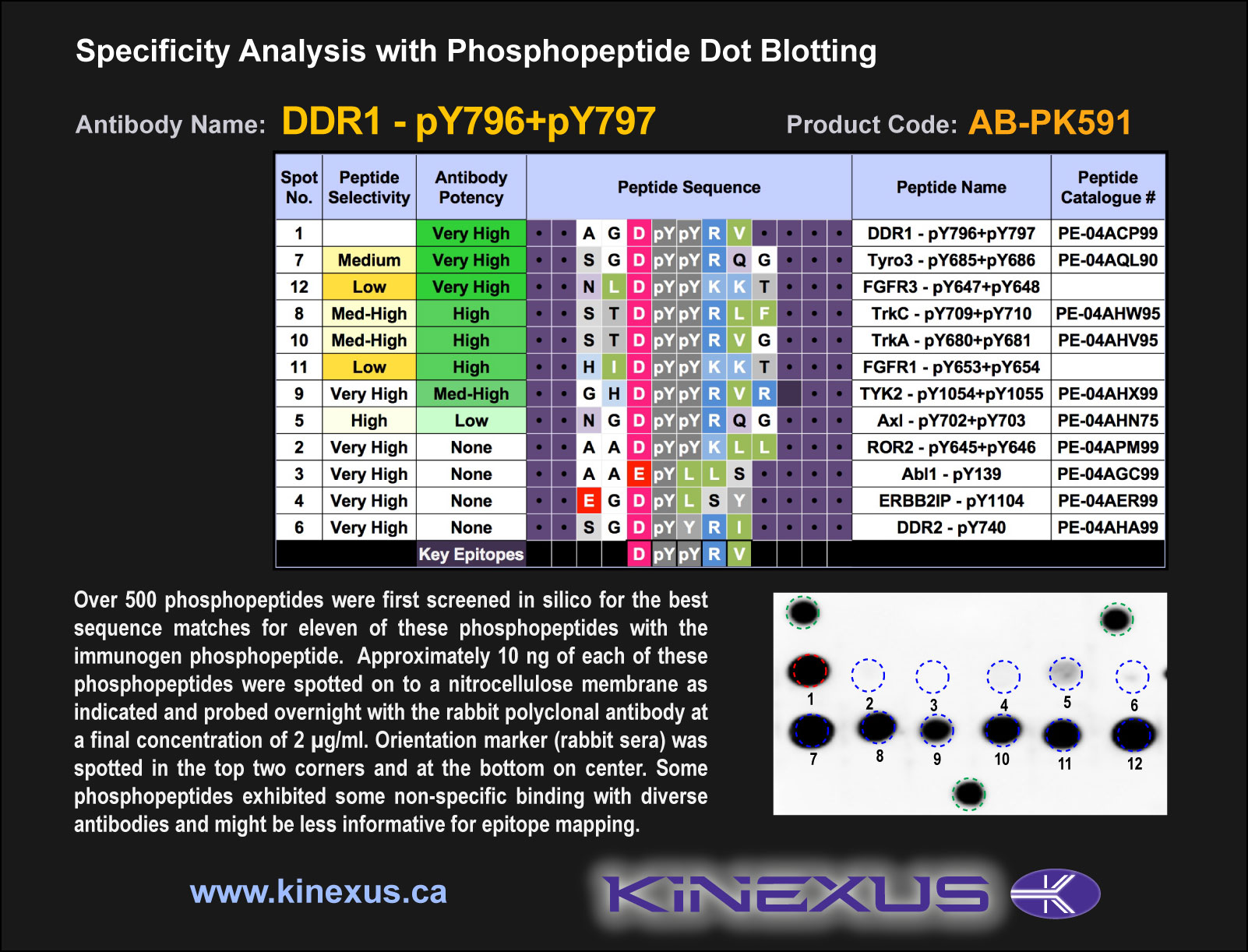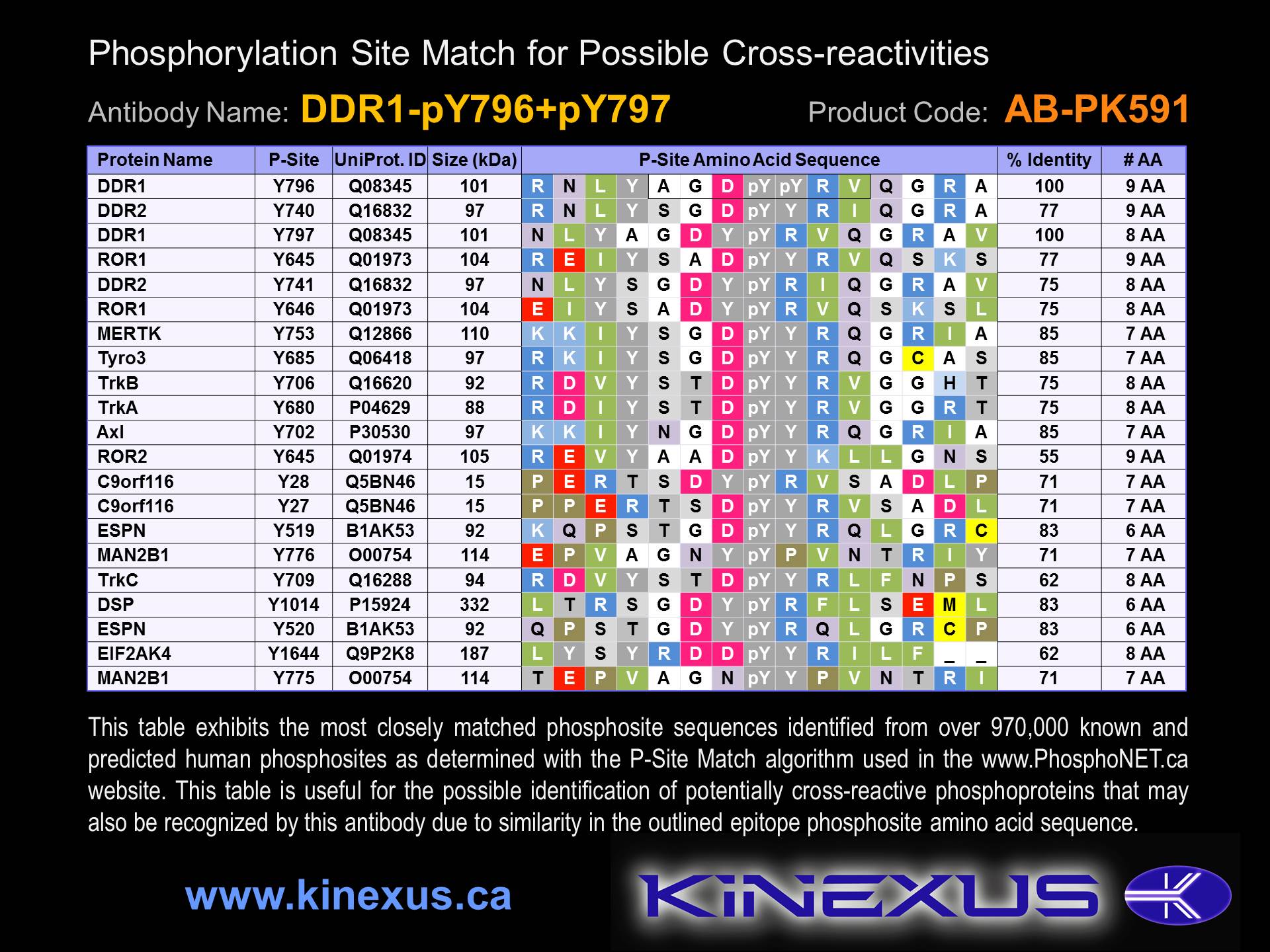Product Name: DDR1-pY796+pY797
Product Number: AB-PK591
| Size: | 25 µg | Price: | 89.00 | |
| $US |
Target Full Name: Epithelial discoidin domain-containing receptor 1
Target Alias: CAK; CD167; CD167a; CD167a antigen; Cell adhesion kinase; Discoidin domain receptor tyrosine kinase 1; Discoidin receptor tyrosine kinase ;DDR; EDDR1; MCK10; NEP; NTRK4; PTK3; Tyrosine- protein kinase CAK; ENSG00000215522
Product Type Specific: Protein kinase phosphosite-specific antibody
Antibody Code: PK591
Antibody Target Type: Phosphosite-specific
Antibody Phosphosite: Y796+Y797
Protein UniProt: Q08345
Protein SigNET: Q08345
Antibody Type: Polyclonal
Antibody Host Species: Rabbit
Target Alias: CAK; CD167; CD167a; CD167a antigen; Cell adhesion kinase; Discoidin domain receptor tyrosine kinase 1; Discoidin receptor tyrosine kinase ;DDR; EDDR1; MCK10; NEP; NTRK4; PTK3; Tyrosine- protein kinase CAK; ENSG00000215522
Product Type Specific: Protein kinase phosphosite-specific antibody
Antibody Code: PK591
Antibody Target Type: Phosphosite-specific
Antibody Phosphosite: Y796+Y797
Protein UniProt: Q08345
Protein SigNET: Q08345
Antibody Type: Polyclonal
Antibody Host Species: Rabbit
Antibody Immunogen Source: Human DDR1 sequence peptide Cat. No.: PE-04ACP99
Antibody Immunogen Sequence: AGD(pY)(pY)RV(bA)C
Antibody Immunogen Description: Corresponds to amino acid residues A793 to V799; In protein kinase catalytic domain activation T-loop between subdomains VII and VIII.
Antibody Immunogen Sequence: AGD(pY)(pY)RV(bA)C
Antibody Immunogen Description: Corresponds to amino acid residues A793 to V799; In protein kinase catalytic domain activation T-loop between subdomains VII and VIII.
Production Method: The immunizing peptide was produced by solid phase synthesis on a multipep peptide synthesizer and purified by reverse-phase hplc chromatography. Purity was assessed by analytical hplc and the amino acid sequence confirmed by mass spectrometry analysis. This peptide was coupled to KLH prior to immunization into rabbits. New Zealand White rabbits were subcutaneously injected with KLH-coupled immunizing peptide every 4 weeks for 4 months. The sera from these animals was applied onto an agarose column to which the immunogen peptide was thio-linked. Antibody was eluted from the column with 0.1 M glycine, pH 2.5. Subsequently, the antibody solution was neutralized to pH 7.0 with saturated Tris.This antibody was also subject to negative purification over phosphotyrosine-agarose.
Antibody Modification: Unconjugated. Contact KInexus if you are interest in having the antibody biotinylated or coupled with fluorescent dyes.
Antibody Modification: Unconjugated. Contact KInexus if you are interest in having the antibody biotinylated or coupled with fluorescent dyes.
Antibody Concentration: 0.3 mg/ml
Storage Buffer: Phosphate buffered saline pH 7.4, 0.05% Thimerasol
Storage Conditions: For long term storage, keep frozen at -40°C or lower. Stock solution can be kept at +4°C for more than 3 months. Avoid repeated freeze-thaw cycles.
Product Use: Western blotting | Antibody microarray
Antibody Dilution Recommended: 2 µg/ml for immunoblotting
Antibody Potency: Very strong immunoreactivity with immunogen peptide on dot blots.
Antibody Species Reactivity: Human
Antibody Positive Control: The observed molecular mass of the processed target protein on SDS-PAGE gels is reported to be around 105-120 kDa.
Storage Buffer: Phosphate buffered saline pH 7.4, 0.05% Thimerasol
Storage Conditions: For long term storage, keep frozen at -40°C or lower. Stock solution can be kept at +4°C for more than 3 months. Avoid repeated freeze-thaw cycles.
Product Use: Western blotting | Antibody microarray
Antibody Dilution Recommended: 2 µg/ml for immunoblotting
Antibody Potency: Very strong immunoreactivity with immunogen peptide on dot blots.
Antibody Species Reactivity: Human
Antibody Positive Control: The observed molecular mass of the processed target protein on SDS-PAGE gels is reported to be around 105-120 kDa.
Antibody Specificity: Very high
Antibody Cross Reactivity: No significant cross-reactive proteins detected in A431 and Jurkat cells and sea star oocytes, except for a ~75 kDa protein in FBS-treated A431 cells..
Related Product 1: DDR1-pY796+pY797 blocking peptide
Related Product 2: DDR1-BCT pan-specific antibody (Cat. No.: AB-NK263-1)
Related Product 3: DDR1-pY797 phosphosite-specific antibody (Cat. No.: AB-PK592)
Related Product 4: DDR2Subtide - DDR2 protein kinase substrate peptide
Antibody Cross Reactivity: No significant cross-reactive proteins detected in A431 and Jurkat cells and sea star oocytes, except for a ~75 kDa protein in FBS-treated A431 cells..
Related Product 1: DDR1-pY796+pY797 blocking peptide
Related Product 2: DDR1-BCT pan-specific antibody (Cat. No.: AB-NK263-1)
Related Product 3: DDR1-pY797 phosphosite-specific antibody (Cat. No.: AB-PK592)
Related Product 4: DDR2Subtide - DDR2 protein kinase substrate peptide
Scientific Background: DDR1 is a protein-tyrosine kinase of the TK group and DDR family an an adhesion protein. It is a cell surface receptor for fibrillar collagen and regulates cell attachment, cell migration, differentiation, and cell proliferation. It undergoes autophosphorylation in response to fibrillar collagen binding. Phosphorylation at Y396, Y703 and Y796 induces interaction with SHP2 and Y513 to Shc1. It is mainly expressed by epithelial cells in the kidneys, lungs, gastrointestinal tract, and brain, and may be activated by various types of collagen including types I, II, III, and V. DDR1 can interact with Notch1 and produce a prosurvival effect. It can also enhance cancer cell migration. DDR1 may be an oncoprotein (OP) or a tumour suppressor protein (TSP). DDR1 has been shown to be significantly overexpressed in some human tumours. It has been shown to promote the proliferation of neoplastic cells. Multiple sites of mutation lead to either inhibition or constitutively activation of this receptor. The gene expression was found to be upregulated by p53 in human osteosarcoma cells.
Figure 1. Epitope mapping of DDR1-pY796+pY797 antibody with similar phosphopeptides on dot blots.
Figure 2. Identification of phosphosites related to DDR1-pY796+pY797.
© Kinexus Bioinformatics Corporation 2017



